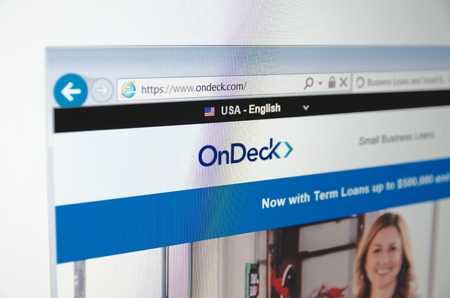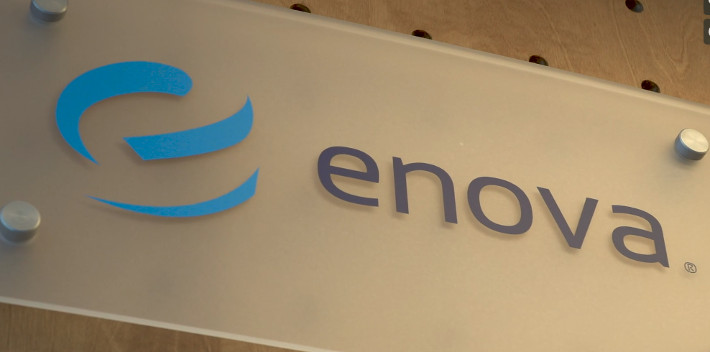Archive for 2021
IOU Financial Inc Surpasses $US 1 Billion in Loan Originations and Establishes All-time Record in Quarterly Loan Originations
November 2, 2021in its 12-year history of funding small business growth in North America
Atlanta, November 2, 2021 – IOU FINANCIAL INC. (“IOU” or “the Company”) (TSX-V: IOU), a leading online lender to small businesses (IOUFinancial.com), announced today that it has surpassed US$1B in total loan originations.
“This is a major milestone for all IOU team members, partners and stakeholders,” said Robert Gloer, President and CEO. “In 12 years, the company has grown but our values have not changed: now more than ever we are committed to exceeding the expectations of our broker partners and the small business owners across North America who rely on our funding solutions to drive their growth plans.”
In addition, IOU announced today that its loan originations for the quarter ended September 30, 2021 surpassed all previous records. The company originated over US$52 million in small business loans in Q3, a new high-water mark in the 12-year history of the company, representing a sequential growth of 51.5% vs. Q2 2021, and 183.1% over Q3 2020.
“We are thrilled to surpass pre-pandemic loan origination numbers and start setting new all-time records for IOU Financial,” said Robert Gloer, President and CEO. “We remain cautiously optimistic that the economic recovery will continue despite the lingering potential macroeconomic and public health risks.”
IOU Financial originated its first loan in December 2009 and quickly positioned itself as a trusted alternative to banks by helping small business owners get fast and easy access to funding visa its proprietary IOU360 technology platform. The Company continued funding small businesses throughout the Covid-19 pandemic and has subsequently introduced the industry-first IOU Financial Cash Back Loan and announced an-all-time record in monthly loan originations.
“We faced the challenges of the COVID-19 pandemic with the same entrepreneurial spirit that drove us to launch IOU Financial on the heels of the 2008 financial crisis – and both experiences have reinforced the importance of helping small businesses adapt to new challenges and grow” added Gloer. “Here’s to the next 12 years of small business growth!”
The Company is due to share its Q3 Financial Results in the coming weeks.
About IOU Financial Inc.
IOU Financial Inc. is a wholesale lender that provides quick and easy access to growth capital to small businesses through a network of preferred brokers across the US and Canada. Built on its proprietary IOU360 technology platform that connects underwriters, merchants and brokers in real time, IOU Financial has become a trusted alternative to banks by underwriting over $984 million as of September 20,2021 in loans to fund small business growth since 2009. IOU trades on the TSX Venture Exchange under the symbol IOU (TSXV: IOU), and on the US OTC markets as IOUFF. To learn more about IOU Financial’s corporate history, financial products, or to join our broker network please visit www.IOUFinancial.com.
Forward Looking Statements
Certain information set forth in this news release may contain forward-looking statements that involve substantial known and unknown risks and uncertainties. These forward-looking statements are subject to numerous risks and uncertainties, certain of which are beyond the control of IOU including, but not limited to, the impact of general economic conditions, industry conditions, dependence upon regulatory and shareholder approvals, the execution of definitive documentation and the uncertainty of obtaining additional financing. Readers are cautioned that the assumptions used in the preparation of such information, although considered reasonable at the time of preparation, may prove to be imprecise and, as such, undue reliance should not be placed on forward-looking statements. IOU does not assume any obligation to update or revise its forward-looking statements, whether as a result of new information, future events, or otherwise.
Neither TSX Venture Exchange nor its Regulation Services Provider (as that term is defined in policies of the TSX Venture Exchange) accepts responsibility for the adequacy or accuracy of this release.
For more information, please contact:
Robert Gloer, Chief Executive Officer, 866-217-8564 ext.308
David Kennedy, Chief Financial Officer, 514-789-0694 ext. 278
Carl Brabander, EVP of Strategy, 866-217-8564 ext. 4378
Appalachian Crowdfunder Gives Take on Business Lending
November 2, 2021 View from outside of Pittsburgh, PA
View from outside of Pittsburgh, PAGeorge Cook, whose family has been running a small community bank in rural Appalachia for over 130 years, has grown up in a world surrounded by banking in some of the most rural parts of America. Now the CEO of Honeycomb Credit, Cook has taken to a crowdfunding platform to start lending to businesses in his area. Cook shared his thoughts with deBanked about the state of lending, and how his product competes with ones already available on the lending market.
Cook spoke about how when he growing up, he always had a fascination with the relationship between the consumer and their banks combined with the difficulties for those consumers to get access to capital. “I spent a lot of time thinking about community banking, especially local capital,” said Cook.
When discussing competing products in the lending space, Cook thinks that his product will innovate his area with a style of lending that benefits both the borrower and investor. It appears that he thinks products like MCAs have become partially antiquated.
“I think the downside of [MCA] is inherently when your value proposition is fast money, you’re going to have a negative selection,” said Cook, when asked about fintech’s role in innovating small business lending. “You’re going to have a lot of desperate businesses who need money fast, which means you inherently have to charge a high interest rate and that has [deterred] a lot of business owners.”
 George Cook, CEO, Honeycomb Credit
George Cook, CEO, Honeycomb CreditCook referenced how the complexity of some MCA deals prevent small businesses from using them. “We talk to a lot of business owners who really don’t understand what a merchant cash advance is, they get caught in a debt trap, and it’s not a good situation. For me, I think the next evolution is, not saying merchant cash advances are going away, but I think they’ve been over extended. I think they’ve been overapplied in places where they don’t make sense.”
Cook hinted at new fintech loan products that have elements of MCA popping up in the lending world, as fintech innovates the industry.
“I think now we’re going to see the fintech space start to right the issue, come up with other capital solutions that make sense for small businesses for longer term capital. I think we’re going to see a lot of term loan products that act with different data and different attributes coming to bear, [thus] being able to bank these businesses.”
After working in fintech building big data credit analytics products prior to starting Honeycomb, Cook claims he saw a major issue with small businesses having access to capital long ago. He saw that the qualifications needed for business loans were the same as ones needed for consumer loans, and many small businesses just didn’t qualify for the capital they needed.
“[The system] didn’t work as well for small business lending because you know, small businesses don’t have as much operating history, they don’t have clean data sets, they’re not keeping their books really well, there’s not really a good data aggregator of small business data.”
Cook continued to speak about the issues with banks evaluating a small businesses’ credit and how this was causing a low approval rating. “A coffee shop looks a lot different than a fitness studio and those look a lot different than a manufacturing plant,” he said. “We were actually seeing a really large decrease in small business lending across the country.”
According to Cook, his company allows investors to take their money and put it right back into the community. He also claims that each one of his customers can expect returns ranging from six to twelve percent on an investment.
Honeycomb makes money on success fees, which are the closing costs on the loan. There’s also an investor fee to get a foot in the door.
“One of the things we’ve found is whenever you have retail investors, you have local people in the community voting with their wallets on these small business loans,” said Cook. “So we’re able to do small business loans in a way that no one else has been able to.”
Ireland is Funding Fintech Through Government Investment
November 2, 2021 The Irish government has taken a serious liking to fintech. With a broad history of being active in financial services, the nation believes they can attract companies from around the world to reap the benefits of employing Irish citizens, while also tapping a major source of export revenue through an up-and-coming industry.
The Irish government has taken a serious liking to fintech. With a broad history of being active in financial services, the nation believes they can attract companies from around the world to reap the benefits of employing Irish citizens, while also tapping a major source of export revenue through an up-and-coming industry.
With access to capital for small businesses just as difficult here as it is in the US, a new fintech company looking for start-up cash may be able to turn to Dublin to get a major investment, rather than dealing with a retail investor or a venture capital firm here in the states. Enterprise Ireland, the organzation that runs these programs, is trying to tempt fintech companies looking for a fresh start or an international expansion to start that process in Ireland.
“Enterprise Ireland is the trade development and venture capital arm of the Irish Government,” said Claire Verville, Senior Vice President of Fintech and Financial Services at Enterprise Ireland. “We are a semi state agency and our mandate is to help support indigenous Irish enterprise to grow and expand in global markets.”
Just like in the United States, it is extremely difficult for an Irish business to walk into a big bank and get a loan. It’s in these situations where the Irish government has decided to make a direct investment themselves. Through Enterprise Ireland, according to Verville, the Irish government can provide capital to startups across a range of areas, in exchange for things like loan repayment or government equity in the company.
“In addition to the kind of more traditional trade development stuff that you would see from any government promoting their indigenous businesses abroad, we do invest directly in companies through equity and participate directly as a [limited partner] in funds to funds.”
Verville spoke about how the Irish government has been looking to extend funding to fintech startups for some time. “Our fintech portfolio is over 200 companies now, we have been one of the most active investors in Europe in a long time. We are one of the most active global investors across all sectors, and we’re really focused on early stage capital for fintech.”
 When asked about the decision making process that goes into Irish investments, Verville portrayed it the same as if it was a private firm making the same move. “We will vet like any other investment, make sure we’re comfortable with it, make sure that the business is verifiable, and that we understand the track record of the team,” she said.
When asked about the decision making process that goes into Irish investments, Verville portrayed it the same as if it was a private firm making the same move. “We will vet like any other investment, make sure we’re comfortable with it, make sure that the business is verifiable, and that we understand the track record of the team,” she said.
Through investing in fintech, Enterprise Ireland appears to believe they will give their small business owners better access to capital. If the industry can create a Euro-American hub in Ireland, the latest tech and funding innovations will develop there, giving access to that technology to Irish businesses first. If Irish small business lenders can use Irish technology to help an Irish merchant, everyone wins.
With financial innovation in Europe being leaps ahead of the US, Verville believes the Irish employees working in finance would be better suited to deal with some of these new innovations over Americans because of their familiarity with these systems that are already in place. She hinted at things like EMV cards being around in Ireland for years at the consumer level before they ever made it to the United States.
As far as incentive for profit, Enterprise Ireland isn’t concerned with the success of their investment from a financial perspective as other investment groups are. They instead focus on things like employment numbers and longterm sustainability for those jobs acquired through their efforts in investing in industries like fintech.
“Because we are attached to the government, we aren’t a money-making mission as far as venture capitalists go. We are focused on employment in Ireland, which is partly why it’s so important that the companies are founded in Ireland and that they are building their employee base in Ireland, and on export revenue.”
Verville spoke about how only when businesses in Ireland do well, Enterprise Ireland only does well, too. “We do make money off some of our investments, and that’s government money. We get our budget set by the government department every year, just like any other government agency.”
To be eligible for funding from Enterprise Ireland, a business needs to be based in Ireland, have an Irish LLC, and must have a significant amount of Irish employees. According to Verville, the Irish market is ripe for American small businesses, especially alternative finance.
Five Takeaways from Money 20/20
November 1, 2021
I attended Money 20/20 in Las Vegas last week and spoke directly with the people trying to push innovation through the financial world. Whether it’s payment processing, cryptocurrency, cyber security, data entry software, credit card issuing, or lending processes, millennials with impressive resumes are looking to trim the fat from the financial world with their beloved software.
Below are five takeaways I got from attending Money 20/20.
Crypto is Legit- If you’re still thinking crypto has no value, you’re being naive. The crypto space at Money 20/20 was dominated by international transaction companies, crypto conversion companies, crypto investment companies, and even some doing business lending with crypto. These booths had the most energy around them, and there seems to be general excitement from all the groups about the industry. The crypto community is no longer young kids with big ideas, but legitimate investors and money-people that have an unprecedented amount of interest in investing outside of the US dollar.
The Payments Pool is Overflowing- There are hundreds of companies that are competing to carry your dollars from your wallet to a merchant while taking micro-transactions off the top. These companies are competing heavily, and at Money 20/20, there was no end in sight to them. After a while it got exhausting trying to figure out how one differentiated from another. Is there really any room for MORE innovation or have all the bases been covered already?
Innovation is Blind- A massive amount of innovation is being pitched at these events for types of tasks regarding data collection and entry. The thing is, some software writers themselves have no idea how the industries they are innovating currently work. Software developers from major companies told me they had never heard of a loan broker, as they were pitching software that allows merchants to go directly to the lender for an approval on a business loan. How can something be innovated without the innovator knowing what they’re innovating?
Cybersecurity Seems Light- Cybersecurity had a smaller presence than some of the other major categories. One would think that every fintech company would also need strong cybersecurity. Either cybersecurity is going to be dominated by a small group of players or there is a huge opportunity here that is still untapped.
Networking’s Value is Priceless- After doing virtual business for almost two years, the value of a face-to-face meeting with a potential business partner is well worth the price of admission for the attendees. The people I spoke with said that just to have the ability to get thirty minutes at a table with someone was why they were attending. The connections lounge was the most populated place at the event all three days, as companies from across the globe were finally able to converse without a video camera. Believe it or not, people across the financial world have really gotten sick of Zoom.
LendingClub Finding It Pays to be a Bank
November 1, 2021 At $48.75, LendingClub stock recently surpassed the highest valuation it has had since January 2016.
At $48.75, LendingClub stock recently surpassed the highest valuation it has had since January 2016.
Successfully becoming a bank earlier this year and dropping its peer-to-peer lending business for good, the company is showing the benefit of that by recording a net income of $27.2M in Q3.
And its loan business is still strong. LendingClub originated $3.1B in loans last quarter, up from the $2.7B in Q2.
“When we launched back in 2007, LendingClub’s vision was to leverage technology, data and our marketplace model to transform the banking industry,” said company CEO Scott Sanborn on the earnings call. “We began by bringing a traditional credit product, the installment loan into the digital age by moving it online, broadening access, lowering costs and delivering a fast and frictionless experience for borrowers, all while delivering attractive risk-adjusted returns for loan investors.”
In 2014, however, it was their designation as a “tech company” rather than as a financial company that saw their valuation surge to nearly 3x higher than what it is now. (Note: The company did a reverse 1:5 stock split in 2019). But now as a bank, that valuation is surging back.
“Now with the added funding benefit of our bank, we’re able to generate positive unit economics,” Sanborn said.
OnDeck originated $462M in Small Business Loans in Q3
October 28, 2021 Enova, through OnDeck, originated $462M in small business loans in Q3, according to the company’s earnings call. That was up from $400M the quarter before.
Enova, through OnDeck, originated $462M in small business loans in Q3, according to the company’s earnings call. That was up from $400M the quarter before.
“…as we’ve been predicting, small businesses have been beneficiaries of the pent-up consumer demand and the resulting increased spending,” said Enova CEO David Fisher.
Fisher also touched upon the CFPB regulatory inquiry disclosed in the earnings release, downplaying it somewhat as “routine.”
“I want to touch on the CID that we announced in our press release,” he said. “The CFPB is investigating a handful of issues several which were self reported by Enova. We have been cooperating fully with the CFPB as we always do. This is a routine process with the CFPB, particularly in our industry. We’ve been through it with them in the past. As a result, we anticipate being able to work with the CFPB to expeditiously complete this investigation.”
This story has been updated to fix typos
CEO of Square Says That Hyperinflation is Happening
October 28, 2021There seems to be consensus the US is experiencing inflation in 2021, but few people of business intelligence are making a rational argument that we’re in the midst of hyperinflation. Such a scenario, if true, might mean that a cup of coffee could cost $200 by next year.
“It’s happening,” tweeted Jack Dorsey, the CEO of both Square and Twitter. “Hyperinflation is going to change everything.”
Hyperinflation is going to change everything. It’s happening.
— jack⚡️ (@jack) October 23, 2021
Perhaps Dorsey’s bearish view on cash, ironic given that his company operates Cash App, has something to do with his bullish views on cryptocurrency. Fifty eight percent of Square’s total net revenue in the 2nd quarter came from Bitcoin.
“While bitcoin revenue was $2.72 billion in the second quarter of 2021, up approximately 3x year over year, bitcoin gross profit was only $55 million, or approximately 2% of bitcoin revenue,” the company said at the end of Q2.
Square made no mention of inflation in its Q2 earnings, nor in the call with analysts that followed. The company makes more than $1 billion in small business loans per year, a business that would likely be impacted by “hyperinflation.”
A hyperinflationary economy would cause strange situations in low interest rate environments in which borrowers pay back far less than what they borrowed on a value basis. If rates are low and loan payments are fixed, the borrower might as well borrow everything they could from every source available and turn it into something that will keep up with price increases.
Dorsey’s comments weren’t a one-off. He doubled down on his prediction just seven minutes later.
It will happen in the US soon, and so the world.
— jack⚡️ (@jack) October 23, 2021
He continued by saying that hyperinflation wasn’t a wish, nor did he think it was positive. He then laughed at Steve Hanke, a well regarded economist at John Hopkins University for condemning his statements.
🤣
— jack⚡️ (@jack) October 24, 2021
If Dorsey is right, and we’re all paying $200 for a cup of coffee in 2022, he would actually be one of the first people to see it happening since so many small businesses, including coffee shops, rely on Square as their POS software.
Enova Posts Q3 Results, Admits It is Dealing With Regulatory Situation
October 28, 2021 Enova’s Q3 report is very brief and to the point. Through both its consumer loan and business loan operations, the company generated a net income of $52M on $320M in revenue.
Enova’s Q3 report is very brief and to the point. Through both its consumer loan and business loan operations, the company generated a net income of $52M on $320M in revenue.
“We are pleased to again report a strong quarter of growth across all of our businesses,” said David Fisher, Enova’s CEO.
There was no mention of OnDeck by name this time around, its major small business lending division. Instead, Enova was sure to draw attention to a regulatory inquiry it had received from the CFPB.
“The Company has received a Civil Investigative Demand (‘CID’) from the Consumer Financial Protection Bureau (‘CFPB’) concerning certain loan processing issues,” the company stated. “Enova has been cooperating fully with the CFPB by providing data and information in response to the CID. Enova anticipates being able to expeditiously complete the investigation as several of the issues were self-disclosed and the Company has provided, and will continue to provide, restitution to customers who may have been negatively impacted.”
The language is particularly concessive. Whatever happened, they felt the need to self-report it and to provide restitution to customers.
This is likely to be queried in more detail during the company’s earnings call this evening.





























